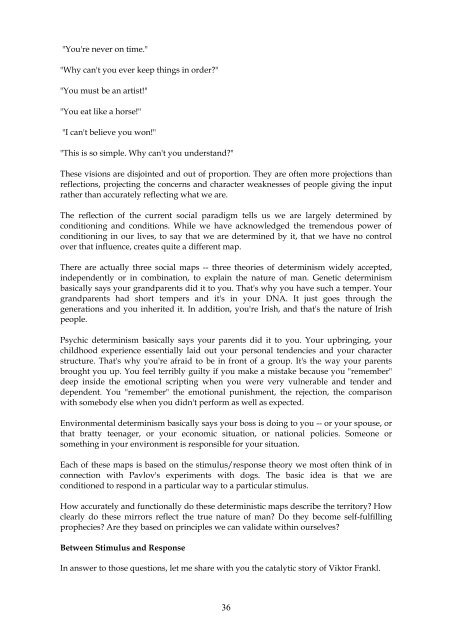Covey - The 7 habits of highly effective people
Create successful ePaper yourself
Turn your PDF publications into a flip-book with our unique Google optimized e-Paper software.
"You're never on time."<br />
"Why can't you ever keep things in order?"<br />
"You must be an artist!"<br />
"You eat like a horse!"<br />
"I can't believe you won!"<br />
"This is so simple. Why can't you understand?"<br />
<strong>The</strong>se visions are disjointed and out <strong>of</strong> proportion. <strong>The</strong>y are <strong>of</strong>ten more projections than<br />
reflections, projecting the concerns and character weaknesses <strong>of</strong> <strong>people</strong> giving the input<br />
rather than accurately reflecting what we are.<br />
<strong>The</strong> reflection <strong>of</strong> the current social paradigm tells us we are largely determined by<br />
conditioning and conditions. While we have acknowledged the tremendous power <strong>of</strong><br />
conditioning in our lives, to say that we are determined by it, that we have no control<br />
over that influence, creates quite a different map.<br />
<strong>The</strong>re are actually three social maps -- three theories <strong>of</strong> determinism widely accepted,<br />
independently or in combination, to explain the nature <strong>of</strong> man. Genetic determinism<br />
basically says your grandparents did it to you. That's why you have such a temper. Your<br />
grandparents had short tempers and it's in your DNA. It just goes through the<br />
generations and you inherited it. In addition, you're Irish, and that's the nature <strong>of</strong> Irish<br />
<strong>people</strong>.<br />
Psychic determinism basically says your parents did it to you. Your upbringing, your<br />
childhood experience essentially laid out your personal tendencies and your character<br />
structure. That's why you're afraid to be in front <strong>of</strong> a group. It's the way your parents<br />
brought you up. You feel terribly guilty if you make a mistake because you "remember"<br />
deep inside the emotional scripting when you were very vulnerable and tender and<br />
dependent. You "remember" the emotional punishment, the rejection, the comparison<br />
with somebody else when you didn't perform as well as expected.<br />
Environmental determinism basically says your boss is doing to you -- or your spouse, or<br />
that bratty teenager, or your economic situation, or national policies. Someone or<br />
something in your environment is responsible for your situation.<br />
Each <strong>of</strong> these maps is based on the stimulus/response theory we most <strong>of</strong>ten think <strong>of</strong> in<br />
connection with Pavlov's experiments with dogs. <strong>The</strong> basic idea is that we are<br />
conditioned to respond in a particular way to a particular stimulus.<br />
How accurately and functionally do these deterministic maps describe the territory? How<br />
clearly do these mirrors reflect the true nature <strong>of</strong> man? Do they become self-fulfilling<br />
prophecies? Are they based on principles we can validate within ourselves?<br />
Between Stimulus and Response<br />
In answer to those questions, let me share with you the catalytic story <strong>of</strong> Viktor Frankl.<br />
36


